Calls for Introduction of Nagorno-Karabakh Human Rights Act
WASHINGTON, D.C. – The Congressional Tom Lantos Human Rights Commission held an emergency hearing on the ongoing blockade of Nagorno-Karabakh’s Lachin Corridor on Wednesday, September 6, 2023, emphasizing the deteriorating conditions on the ground in Artsakh, and the ongoing humanitarian crisis, reported the Armenian Assembly of America (Assembly). Representative Christopher H. Smith (R-NJ), Co-Chair of the Commission, recommended holding Azerbaijan’s President Ilham Aliyev accountable for his genocidal intent, and stressed the need for new legislation, including the “Nagorno-Karabakh Human Rights Act.”
The hearing featured testimony from Luis Morena Ocampo, former prosecutor of the International Criminal Court, and David L. Phillips, Adjunct Professor at Georgetown University and Director of Columbia University’s Program on Human Rights and Peace-building and the Atrocities Artsakh Project. In addition, the Assembly also submitted testimony.
In his remarks, Rep. Smith noted that “120,000 ethnic Armenians have been sealed off from food and medicine and are being starved to death by the government of Azerbaijan…the starvation process has been advancing at a terrifying rate.”
He underscored that Azerbaijan’s illegal blockade of the Lachin Corridor is a “crime of genocide that was planned, tested and imposed by… President Aliyev, who rules Azerbaijan with an iron fist as a dictator.”
Rep. Smith announced that a Nagorno-Karabakh Human Rights Act will soon be introduced in order for the Legislative and Executive branches to speak out “boldly and accurately” about the intent of genocide occurring in Artsakh.
Tracing the history of Armenians in Nagorno-Karabakh back 2,000 years, he stated that Armenians have “defended and governed themselves” since their independence in 1994, with an ability to be “connected to the outside world by the Lachin Corridor, as per international agreements.”
In light of its illegal and unjustified blockade of the Lachin Corridor, Rep. Smith expressed that “the government of Azerbaijan..seeks to fully integrate Nagorno-Karabakh into Azerbaijan…[which is] totally and absolutely unacceptable to achieve that through genocide.”
“I respectfully urge the Administration to please wake up, recognize the absolute grave responsibility it has here and focus on finding and implementing a humane situation now and this must mean that the blockade is lifted and the people continue to live in their ancient homeland,” he concluded.
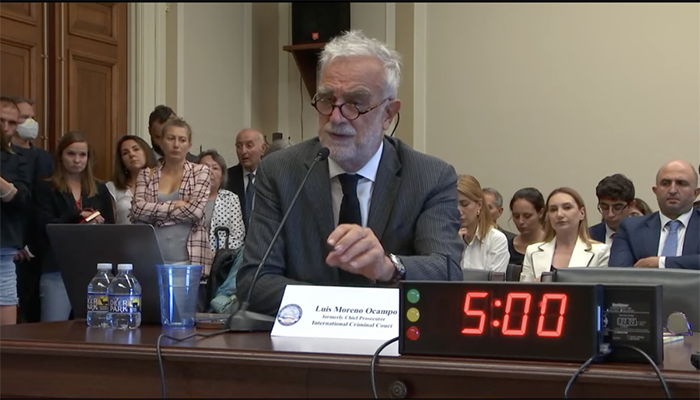

During his testimony, Ocampo followed up on his Expert Opinion released on August 7, 2023, where he stated that “there is a reasonable basis to believe that a Genocide is being committed against Armenians living in Nagorno-Karabakh in 2023” and emphasizing that under the Genocide Conventions all states have a “duty to prevent” genocide.
Ocampo once again emphasized that a genocide is “happening now” and clarified the misconception that genocide requires mass killings to be defined as such.
“There are different forms to committing genocide,” said Ocampo. “The crime can be to create the conditions of genocide.” He noted that blocking the Lachin Corridor and not allowing essential goods to reach the Armenian people is “creating the conditions of genocide under Article 2(c) [of the Convention on the Prevention and Punishment of the Crime of Genocide].”
Ocampo said it was “easy” to come to a conclusion regarding genocide due to the ICC’s ruling in February 2023 that Azerbaijan must open the Lachin Corridor.
“Fifteen judges on the ICC in The Hague reviewed the issue after listening to Armenia and Azerbaijan representatives and they concluded that blocking the Lachin Corridor was creating an imminent risk for the life of Armenians living in Nagorno-Karabakh,” said Ocampo. “The material element of genocide was obviously there.”
Ocampo emphasized that the “urgency is to prevent the harm” and stop genocide. He expressed the importance of the special hearing because the “first step is to remove the denial.”
“This [hearing] could be a turning point on denial,” said Ocampo, who recommended to the Commission that information is sent to the Executive Branch to indicate the urgency of the matter.
He opined that the U.S. shouldn’t be involved in negotiations when “Aliyev uses genocide as a method of the negotiation,” because then the U.S. can be “considered complicit.”
“Stop the denial, recognize the [genocidal intent], and protect the lives of the 120,000 Armenians in Nagorno-Karabakh,” he concluded.
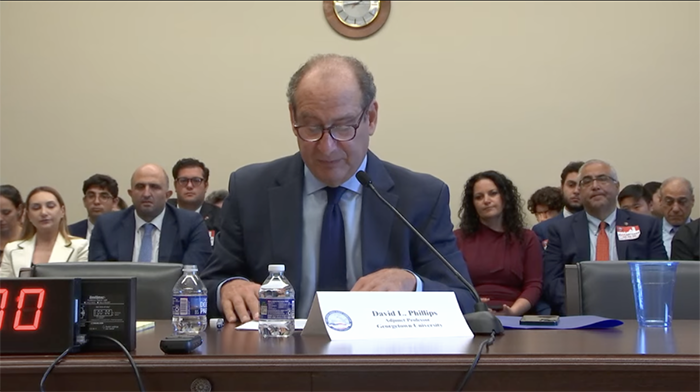

In his testimony, Phillips outlined the Aliyev regime’s “genocidal intent to erase the Armenian physical, religious and cultural presence in Artsakh and eventually the current Republic of Armenia.”
He highlighted Aliyev’s anti-Armenian rhetoric that has focused on education, public campaigns, censorship and “other methods aimed at dehumanizing Armenian Christians” has only intensified as the government has violated cease-fires and orchestrated attacks, including on Sev Lake [Black Lake] on September 13, 2022, wherein a video released in early October 2022, and verified by independent media, “showed extrajudicial killing of at least 7 Armenian military personnel who were captured as prisoners of war,” said Phillips. “This extrajudicial killing was conducted when the Armenian military personnel were already bound and disarmed, and in custody of Azerbaijan.”
Phillips stated that both Artsakh and Armenia are “functioning, established democracies” with permanent ties to the U.S. and that the U.S. should enforce the sanctions of Section 907 of the FREEDOM Support Act, the Humanitarian Aid Corridors Act, and the Global Magnitsky Act.”
He also warned that if the situation is not “dramatically reversed soon, the U.S. and its allies should give the Armenians the means to defend themselves in exercise of the duty to prevent genocide, lest history repeat itself.”
He noted that the ICC decision requires the enforcement of the opening of the Lachin Corridor, which was part of the November 2020 trilateral ceasefire agreement and called the Commission’s attention to perpetrators who have “evaded sanction or any consequence to their actions, which has only enabled further atrocities and genocidal acts to continue and ask that Congress exercise its power to stop this genocide.”
In his concluding thoughts, Phillips emphasized that the failure of the international community to “sanction individuals who committed crimes after the war in 2016 and 2020…allowed the Government of Azerbaijan to act with impunity and escape repercussions for its crimes against humanity, ethnic cleansing and acts of genocide.”
“This signaled Azerbaijan as well as other regimes around the world that they can escape consequences for violating international humanitarian law and committing crimes against humanity.”
During a brief question and answer session, Ocampo said he did not know how much longer the Armenian people in Nagorno-Karabakh can survive the blockade.
“This is a clear cut case where the responsible person is obviously, without a doubt, President Aliyev,” said Ocampo. “He was personally put on notice by Secretary Blinken, by the ICC, by the UN Secretary General Guterres, and [other] global leaders he ignored while committing genocidal acts.”
Adding onto Ocampo’s insights, Phillips reiterated the importance of leaders enforcing existing U.S. law the Administration has at its disposal, including Section 907 of the FREEDOM Support Act and the Global Magnitsky Act, which Co-Chair Smith first introduced in the House in January 2015.

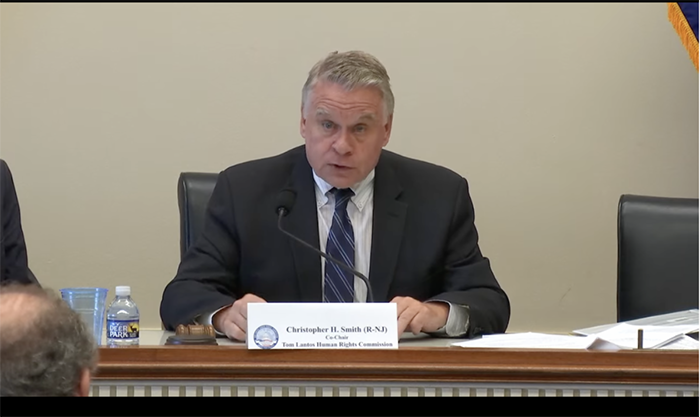

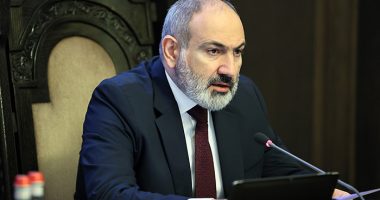


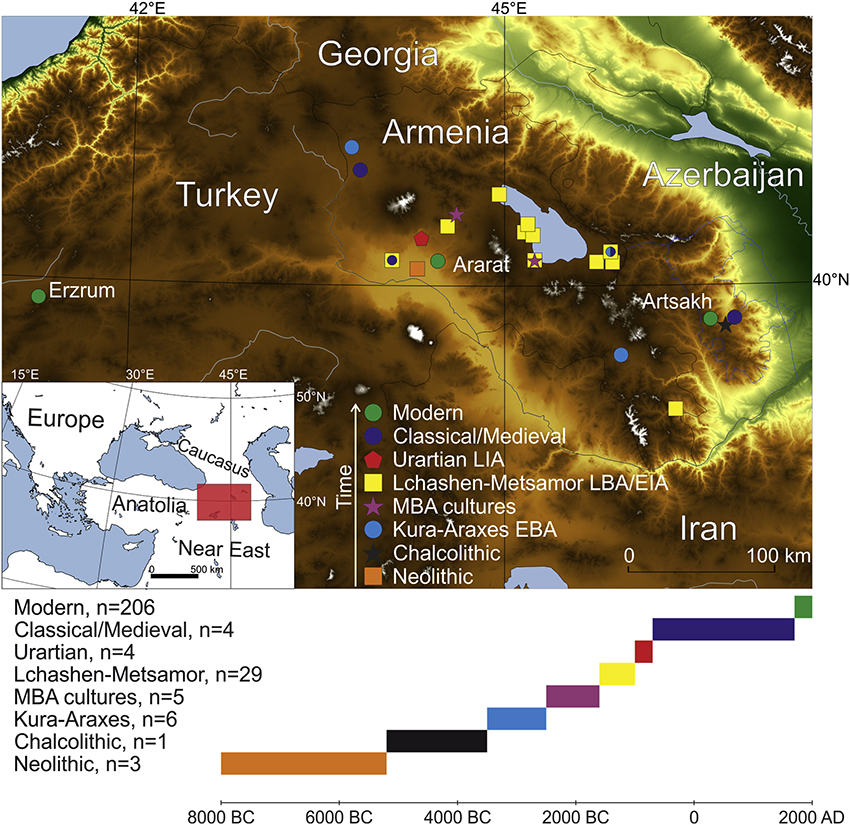




1 comment
It is noteworthy that no representative from the US State Department or USAID was present at this hearing. I guess they were too busy having an extra course at lunch while innocent people in Artsakh are starving.
For months exhortations from international leaders to lift the blockade have not moved Aliyev. Words without concrete action are now disingenuous. A humanitarian airlift into Nagorno Karabakh would provide immediate relief. Imposing Magnitsky sanctions on the responsible Azerbaijani officials and blocking aid to Azerbaijan would send a clear message that state sponsored genocide is not an acceptable tactic. Failure to do so would demonstrate unconscionable weakness by President Biden and Secretary Blinken. It would also make the United States of America complicit in the crime of Genocide and this would be a legitimate election issue in 2024.